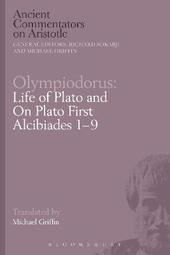
|
Olympiodorus: Life of Plato and On Plato First Alcibiades 1-9
Hardback
Main Details
| Title |
Olympiodorus: Life of Plato and On Plato First Alcibiades 1-9
|
| Authors and Contributors |
Edited by Michael Griffin
|
| Series | Ancient Commentators on Aristotle |
|---|
| Physical Properties |
| Format:Hardback | | Pages:256 | | Dimensions(mm): Height 234,Width 156 |
|
| Category/Genre | Western philosophy - Ancient to c 500
Ethics and moral philosophy |
|---|
| ISBN/Barcode |
9781472588302
|
| Classifications | Dewey:184 |
|---|
| Audience | | Tertiary Education (US: College) | |
|---|
|
Publishing Details |
| Publisher |
Bloomsbury Publishing PLC
|
| Imprint |
Bloomsbury Academic
|
| Publication Date |
18 December 2014 |
| Publication Country |
United Kingdom
|
Description
Olympiodorus (AD c. 500-570), possibly the last non-Christian teacher of philosophy in Alexandria, delivered these lectures as an introduction to Plato with a biography. For us, they can serve as an accessible introduction to late Neoplatonism. Olympiodorus locates the First Alcibiades at the start of the curriculum on Plato, because it is about self-knowledge. His pupils are beginners, able to approach the hierarchy of philosophical virtues, like the aristocratic playboy Alcibiades. Alcibiades needs to know himself, at least as an individual with particular actions, before he can reach the virtues of mere civic interaction. As Olympiodorus addresses mainly Christian students, he tells them that the different words they use are often symbols of truths shared between their faiths.
Author Biography
Olympiodorus (AD c. 500-570 CE) was one of the latest non-Christian teachers of pagan philosophy in Alexandria. Michael Griffin is Assistant Professor of Classics and Philosophy at the University of British Columbia, Vancouver, Canada.
Reviews[Olympiodorus' Alcibiades commentary] has remained untranslated since the appearance of the critical edition nearly sixty years ago. [This volume] is thus a step towards filling a definite gap in the scholarship ... The book will be helpful to anyone interested in Olympiodorus' commentary who is more comfortable reading English than Greek. * Bryn Mawr Classical Review *
|